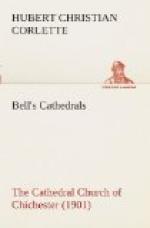The see of Selsea was governed by three other bishops till William appointed one of his chaplains to the office. This was #Stigand# (1070-1087), but not that Stigand (the Primate) who at the same royal bidding had to make room for Lanfranc. It was while he was still an occupant of the see that the transfer to Chichester was effected. He earned the displeasure of the king by refusing to consecrate Gausbert to the Abbey of Battle unless the monk would come to Chichester for the ceremony. He had some trouble, too, with his metropolitan, Lanfranc, on account of a dispute concerning the limits of his jurisdiction. Certain parishes within the territory of his diocese were claimed as subject to the more eastern see. The Primate established his right to these “peculiars,” and the right obtained until the last century, when all such holdings were abolished by law.
#Godfrey# (1087-1088) evidently incurred the displeasure of his papal superior, as the only known record of his very brief episcopate is represented by a discovery which was made in 1830 when an absolution from the Pope, inscribed upon a leaden cross, was dug up in the paradise close to the south choir aisle.
It was not till three years had elapsed since Godfrey’s death that #Ralph de Luffa# (1091-1123) was consecrated to the vacancy by Thomas, Archbishop of York. Meanwhile the king enjoyed the temporalities of the see. In his person we meet a figure of much importance to the history of the fabric and see, for to his energy and initiative we owe the greater part of the cathedral building that remains to-day.
Ralph’s activity was not wholly absorbed by his interest in the architectural idea which he hoped to realise. He spent much time and care attending to the needs of the churches of which he was the overseer. He visited them regularly three times in the year for the purpose of effecting reforms when they were necessary, for teaching, and for developing the organisation of the diocese as it was affected by the condition of each parochial unit. Thus by his office and oversight he was endeavouring to maintain the necessary relations between the particular churches and their cathedral centre. In defence of these same members of the local and general ecclesiastical body he was obliged to resent the attempted interference of two kings of the realm. Henry I. wished to fill his pockets by imposing fines upon the clergy. To oppose this the bishop closed all the churches in the diocese and blocked up the entrances with thorns; and so, except in the monasteries, the offering of public worship ceased. The restriction was in time removed, and the king acknowledged the bishop’s plea that he should endeavour to replenish the coffers of his poor see, so that the injured cathedral might be repaired, rather than reduce it to poverty by extortion.
Ralph is credited with having established the office of “dean” [31] at Chichester—the first of the four cathedral dignitaries, of which the others are the praecentor, the chancellor, and the treasurer.




